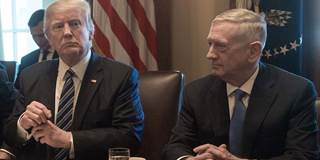The US Department of Defense’s decision to drop an 11-ton "super bomb" over a geographically isolated Islamic State redoubt in Afghanistan does not reflect a coherent counterterrorism policy. In fact, it was an example of political leaders allowing military means to determine foreign-policy ends.
NEW YORK – The US Department of Defense’s decision to drop an 11-ton Massive Ordnance Air Blast (MOAB) bomb over a remote Islamic State (ISIS) redoubt in Afghanistan does not reflect a coherent counterterrorism policy. As many commentators have pointed out, it was yet another case of tactics swallowing strategy – a mode of policymaking that was auditioned a week earlier in Syria and that could lead to catastrophe if tried on, say, the Korean Peninsula.

NEW YORK – The US Department of Defense’s decision to drop an 11-ton Massive Ordnance Air Blast (MOAB) bomb over a remote Islamic State (ISIS) redoubt in Afghanistan does not reflect a coherent counterterrorism policy. As many commentators have pointed out, it was yet another case of tactics swallowing strategy – a mode of policymaking that was auditioned a week earlier in Syria and that could lead to catastrophe if tried on, say, the Korean Peninsula.